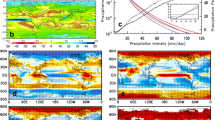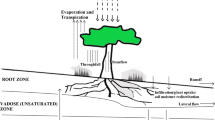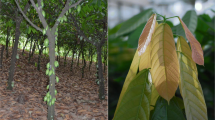Abstract
Drylands are predicted to become more arid and saline due to increasing global temperature and drought. Although species from the Caatinga, a Brazilian tropical dry forest, are tolerant to these conditions, the capacity for germination to withstand extreme soil temperature and water deficit associated with climate change remains to be quantified. We aimed to evaluate how germination will be affected under future climate change scenarios of limited water and increased temperature. Seeds of three species were germinated at different temperatures and osmotic potentials. Thermal time and hydrotime model parameters were established and thresholds for germination calculated. Germination performance in 2055 was predicted, by combining temperature and osmotic/salt stress thresholds, considering soil temperature and moisture following rainfall events. The most pessimistic climate scenario predicts an increase of 3.9 °C in soil temperature and 30% decrease in rainfall. Under this scenario, soil temperature is never lower than the minimum and seldomly higher than maximum temperature thresholds for germination. As long as the soil moisture (0.139 cm3 cm3) requirements are met, germination can be achieved in 1 day. According to the base water potential and soil characteristics, the minimum weekly rainfall for germination is estimated to be 17.5 mm. Currently, the required minimum rainfall occurs in 14 weeks of the year but will be reduced to 4 weeks by 2055. This may not be sufficient for seedling recruitment of some species in the natural environment. Thus, in future climate scenarios, rainfall rather than temperature will be extremely limiting for seed germination.




Similar content being viewed by others
References
Albuquerque UP, de Lima Araújo E, El-Deir ACA et al (2012) Caatinga revisited: ecology and conservation of an important seasonal dry forest. Sci World J 2012:1–18. https://doi.org/10.1100/2012/205182
Antunes CGC, Pelacani CR, Ribeiro RC et al (2010) Influência do armazenamento na qualidade fisiológica de sementes de Caesalpinia pyramidalis Tul. Rev Árvore 34:1001–1008
Bakke IA, de Freire ALO, Bakke OA et al (2006) Water and sodium effects on Mimosa tenuiflora (Willd.) Poiret seed germination. Rev Caatinga 19:261–267
Bierhuizen JF, Wagenvoort WA (1974) Some aspects of seed germination in vegetables. 1. The determination and application of heat sums and minimum temperature for germination. Sci Hortic (Amsterdam) 2:213–219. https://doi.org/10.1016/0304-4238(74)90029-6
Bradford KJ (1990) A water relations analysis of seed germination rates. Plant Physiol 94:840–849. https://doi.org/10.1104/pp.94.2.840
Chou SC, Marengo JA, Lyra AA et al (2012) Downscaling of South America present climate driven by 4-member HadCM3 runs. Clim Dyn 38:635–653. https://doi.org/10.1007/s00382-011-1002-8
Covell S, Ellis RH, Roberts EH, Summerfield RJ (1986) The influence of temperature on seed germination rate in grain legumes I. A comparison of chickpea, lentil, soyabean and cowpea at constant temperatures. J Exp Bot 37:705–715. https://doi.org/10.1093/jxb/37.5.705
Dantas BF, Correia JDS, Marinho LB, Aragão CA (2008) Biochemical changes during imbibition of Caesalpinia pyramidalis Tul. seeds. Rev Bras Sementes 30:221–227. https://doi.org/10.1590/s0101-31222008000100028
Dantas BF, Lopes AP, Silva FFS et al (2011) Produção de mudas de catingueira-verdadeira (Caesalpinia pyramidalis Tul.) em função de substratos e luminosidades. Científica 39:34–43
Dantas BF, Ribeiro RC, Matias JR, Araújo GGL (2014) Germinative metabolism of Caatinga forest species in biosaline agriculture. J Seed Sci 36:194–203. https://doi.org/10.1590/2317-1545v32n2927
Dürr C, Dickie JB, Yang XY, Pritchard HW (2015) Ranges of critical temperature and water potential values for the germination of species worldwide: contribution to a seed trait database. Agric For, Meteorol, p 200
EMG U (2011) Global drylands: a UN system-wide response. Environment Management Group of the United Nations. Retrieved from http://www.unccd.int/Lists/SiteDocumentLibrary/Publications/Global_Drylands_Full_Report.pdf
Falcão HM, Medeiros CD, Silva BLR et al (2015) Phenotypic plasticity and ecophysiological strategies in a tropical dry forest chronosequence: a study case with Poincianella pyramidalis. For Ecol Manage 340:62–69. https://doi.org/10.1016/J.FORECO.2014.12.029
Fernandes-Júnior PI, de Aidar ST, Morgante CV et al (2015) The resurrection plant Tripogon spicatus (Poaceae) harbors a diversity of plant growth promoting bacteria in northeastern Brazilian Caatinga. Rev Bras Cienc do Solo 39:993–1002. https://doi.org/10.1590/01000683rbcs20140646
Fernández-Pascual E, Jiménez-Alfaro B, Hájek M et al (2015a) Soil thermal buffer and regeneration niche may favour calcareous fen resilience to climate change. Folia Geobot 50:293–301. https://doi.org/10.1007/s12224-015-9223-y
Fernández-Pascual E, Seal CE, Pritchard HW (2015b) Simulating the germination response to diurnally alternating temperatures under climate change scenarios: comparative studies on Carex diandra seeds. Ann Bot 115:201–209. https://doi.org/10.1093/aob/mcu234
Gareca EE, Vandelook F, Fernández M et al (2012) Seed germination, hydrothermal time models and the effects of global warming on a threatened high Andean tree species. Seed Sci Res 22:287–298. https://doi.org/10.1017/S0960258512000189
Gonçalves EO, Paiva HN, Neves JCL, Gomes Mauro J (2012) Nutrição de mudas de (Anadenanthera macrocarpa (Benth.) Brenan) submetidas a doses de N, P, K. Ca E Mg. Rev Arvore 36:219–228
Griz LMS, Machado ICS (2001) Fruiting phenology and seed dispersal syndromes in caatinga, a tropical dry forest in the northeast of Brazil. J Trop Ecol 17:303–321. https://doi.org/10.1017/S0266467401001201
Groves DG, Lempert RJ (2007) A new analytic method for finding policy-relevant scenarios. Glob Environ Chang 17:73–85
Gummerson RJ (1986) The effect of constant temperatures and osmotic potentials on the germination of sugar beet. J Exp Bot 37:729–741. https://doi.org/10.1093/jxb/37.6.729
Harte J, Torn MS, Chang F et al (1995) Global warming and soil microclimate: results from a meadow-warming experiment. Ecol Appl 5:132–150
Huang J, Ji M, Xie Y et al (2016) Global semi-arid climate change over last 60 years. Clim Dyn 46:1131–1150. https://doi.org/10.1007/s00382-015-2636-8
IPCC (2007) Climate change 2007: the physical science basis contribution of working group I to the fourth assessment report of the intergovernmental panel on climate change. Cambridge University Press, Cambridge
Janzen DH (1988) Tropical dry forests the most endangered major tropical ecosystem. In: Wilson EO, Peter FM (eds) Biodiversity, 1st edn. National Academies Press (US), Washington, pp 130–137
Leite EJ (2002) State-of-knowledge on Myracrodruon urundeuva Fr. Allemão (Anacardiaceae) for genetic conservation in Brazil. Perspect Plant Ecol Evol Syst 5:193–206. https://doi.org/10.1078/1433-8319-00034
Marengo JA, Jones R, Alves LM, Valverde MC (2009) Future change of temperature and precipitation extremes in South America as derived from the PRECIS regional climate modeling system. Int J Climatol 29:2241–2255. https://doi.org/10.1002/joc.1863
Marengo JA, Torres RR, Alves LM (2017) Drought in Northeast Brazil—past, present, and future. Theor Appl Climatol 129:1189–1200. https://doi.org/10.1007/s00704-016-1840-8
Marin A, dos Santos DMM, Banzatto DA, Ferraudo AS (2004) Germinação de sementes de guandu sob efeito da disponibilidade hídrica e de doses subletais de alumínio. Bragantia 63:13–24. https://doi.org/10.1590/S0006-87052004000100002
Mesinger F, Chou SC, Gomes JL et al (2012) An upgraded version of the Eta model. Meteorol Atmos Phys 116:63–79. https://doi.org/10.1007/s00703-012-0182-z
Miles L, Newton AC, DeFries RS et al (2006) A global overview of the conservation status of tropical dry forests. J Biogeogr 33:491–505. https://doi.org/10.1111/j.1365-2699.2005.01424.x
Mogni VY, Oakley LJ, Prado DE (2015) The distribution of woody legumes in neotropical dry forests: the pleistocene arc theory 20 years on. Edinburgh J Bot 72:35–60. https://doi.org/10.1017/S0960428614000298
Moro MF, Nic Lughadha E, de Araújo FS, Martins FR (2016) A phytogeographical metaanalysis of the semiarid caatinga domain in Brazil. Bot Rev 82:91–148. https://doi.org/10.1007/s12229-016-9164-z
Moura MSB, Souza LSB, Randow CV, da Silva TGF (2015) Perfil vertical de CO2 na caatinga preservada: resultados preliminares. Agrometeorologia no século 21:o desafio sustentável dos biomas brasileiros. UFLA, Lavras, pp 307–316
Nascimento PS, Bassoi LH, Paz VPS et al (2010) Estudo comparativo de métodos para a determinação da curva de retenção de água no solo. Irriga 15:193–207
O’Brien MJ, Burslem DFRP, Caduff A et al (2015) Contrasting nonstructural carbohydrate dynamics of tropical tree seedlings under water deficit and variability. New Phytol 205:1083–1094. https://doi.org/10.1111/nph.13134
Oliveira RLC, Lins Neto EMF, Araújo EL, Albuquerque UP (2007) Conservation priorities and population structure of woody medicinal plants in an area of Caatinga vegetation (Pernambuco State, NE Brazil). Environ Monit Assess 132:189–206. https://doi.org/10.1007/s10661-006-9528-7
Oliveira GM, Silva FFS, Araujo MN et al (2019) Environmental stress, future climate, and germination of Myracrodruon urundeuva seeds. J Seed Sci 41:32–43. https://doi.org/10.1590/2317-1545v41n1191945
Ooi MKJ, Auld TD, Denham AJ (2009) Climate change and bet-hedging: interactions between increased soil temperatures and seed bank persistence. Glob Chang Biol 15:2375–2386. https://doi.org/10.1111/j.1365-2486.2009.01887.x
Orrù M, Mattana E, Pritchard HW, Bacchetta G (2012) Thermal thresholds as predictors of seed dormancy release and germination timing: altitude-related risks from climate warming for the wild grapevine Vitis vinifera subsp. sylvestris. Ann Bot 110:1651–1660. https://doi.org/10.1093/aob/mcs218
Pacchioni RG, Carvalho FM, Thompson CE et al (2014) Taxonomic and functional profiles of soil samples from Atlantic forest and Caatinga biomes in northeastern Brazil. Microbiologyopen 3:299–315. https://doi.org/10.1002/mbo3.169
Parvaiz A, Satyawati S (2008) Salt stress and phyto-biochemical responses of plants-a review. Plant Soil Envorinnment 3:89–99
Pavlik BM (1994) Demographic monitoring and the recovery of endangered plant populations. In: Bowles ML, Whelan CJ (eds) Restoration of endangered species. Cambridge University Press, Cambridge, pp 322–350
Pessoa LGM, Freire MBGDS, Wilcox BP et al (2016) Spectral reflectance characteristics of soils in northeastern Brazil as influenced by salinity levels. Environ Monit Assess 188:616. https://doi.org/10.1007/s10661-016-5631-6
Pinho DS, de Borges EELE, Corte VB, Nasser LCB (2009) Evaluation of the physiological quality of Anadenenthera peregrina (L.) Speg. seeds during storage. Rev Árvore 33:27–33. https://doi.org/10.1590/S0100-67622009000100004
Portillo-Quintero CA, Sánchez-Azofeifa GA (2009) Extent and conservation of tropical dry forests in the Americas. Biol Conserv 143:144–155. https://doi.org/10.1016/j.biocon.2009.09.020
Queiroz LP, Cardoso D, Fernandes MF, Moro MF (2017) Diversity and evolution of flowering plants of the Caatinga domain. Caatinga. Springer International Publishing, Cham, pp 23–63
Reino J, Sánchez JA, Muñoz B et al (2011) Efecto combinado de la escarificación y la temperatura en la germinación de semillas de leguminosas herbáceas. Pastos y Forrajes 34:179–184
Reis RCR, Dantas BF, Pelacani CR (2012) Mobilization of reserves and germination of seeds of Erythrina velutina Willd. (Leguminosae-Papilionoideae) under different osmotic potentials. Rev Bras Sementes 34:580–588. https://doi.org/10.1590/S0101-31222012000400008
Rengasamy P (2006) World salinization with emphasis on Australia. J Exp Bot 57:1017–1023. https://doi.org/10.1093/jxb/erj108
Ribeiro RC, Matias JR, Pelacani CR, Dantas BF (2014) Activity of antioxidant enzymes and proline accumulation in Erythrina velutina Willd. seeds subjected to abiotic stresses during germination. J Seed Sci 36:231–239. https://doi.org/10.1590/2317-1545v32n2956
Rodal MJN, Nascimento LM (2006) The arboreal component of a dry forest in Northeastern Brazil. Brazilian J Biol 66:479–491. https://doi.org/10.1590/S1519-69842006000300014
Rodrigues P, Silva J, Eisenlohr P, Schaefer C (2015) Climate change effects on the geographic distribution of specialist tree species of the Brazilian tropical dry forests. Brazilian J Biol 75:679–684. https://doi.org/10.1590/1519-6984.20913
Sala OE, Lauenroth WK (1982) Small rainfall events: an ecological role in semiarid regions. Oecologia 53:301–304
Santos TEM, Montenegro AAA, Silva DD (2011) Umidade do solo no semiárido pernambucano usando-se reflectometria no domínio do tempo (TDR). Rev Bras Eng Agrícola e Ambient 15:670–679. https://doi.org/10.1590/S1415-43662011000700004
Santos DM, Santos JMFF, Silva KA et al (2016) Composition, species richness, and density of the germinable seed bank over 4 years in young and mature forests in Brazilian semiarid regions. J Arid Environ 129:93–101. https://doi.org/10.1016/J.JARIDENV.2016.02.012
Schulz K, Voigt K, Beusch C et al (2016) Grazing deteriorates the soil carbon stocks of Caatinga forest ecosystems in Brazil. For Ecol Manage 367:62–70. https://doi.org/10.1016/J.FORECO.2016.02.011
Seal CE, Daws MI, Flores J et al (2017) Thermal buffering capacity of the germination phenotype across the environmental envelope of the Cactaceae. Glob Chang Biol 23:5309–5317. https://doi.org/10.1111/gcb.13796
Silva FFS, Oliveira GM, Araújo MN et al (2017) Rainfall events, high CO2 concentration and germination seeds of Caatinga. J Environ Anal Prog 2:258–265. https://doi.org/10.24221/jeap.2.3.2017.1453.258-265
Silveira CS, Souza Filho FA, Martins ESPR et al (2016) Mudanças climáticas na bacia do rio São Francisco: uma análise para precipitação e temperatura. Rev Bras Recur Hídricos 21:416–428. https://doi.org/10.21168/rbrh.v21n2.p416-428
Stevens N, Seal CE, Archibald S, Bond W (2014) Increasing temperatures can improve seedling establishment in arid-adapted savanna trees. Oecologia 175:1029–1040. https://doi.org/10.1007/s00442-014-2958-y
Teixeira AHC (2010) Informações agrometeorológicas do polo petrolina, pe/juazeiro. BA, Petrolina
Torres CM, Repke DB (2006) Anadenanthera: visionary plant of ancient South America, Haworth Herbal Press, Binghamton
Tsukamoto Filho AA, Carvalho JLO, Costa RB et al (2013) Regime de regas e cobertura de substrato afetam o crescimento inicial de mudas de myracrodruon urundeuva. Floresta Ambient 20:521–529. https://doi.org/10.4322/floram.2013.032
Villela FA, Doni Filho L, Sequeira EL (1991) Tabela de potencial osmótico em função da concentração de polietileno glicol 6.000 e da temperatura. Pesqui Agropecuária Bras 26:1957–1968
Walck JL, Hidayati SN, Dixon KW et al (2011) Climate change and plant regeneration from seed. Glob Chang Biol 17:2145–2161. https://doi.org/10.1111/j.1365-2486.2010.02368.x
Acknowledgements
We thank Elena C. Lorenzo (Kew/University of Warwick) and Luis H. Bassoi (Embrapa Instrumentation) for their help with germination modelling. Funding was from Embrapa (MP3 03.12.12.004.00), CAPES/Embrapa (Capes-Embrapa—Edital 15/2014 Proposta 171) and FACEPE (APQ 0062-1.07/15—Caatinga-FLUX). Graduate scholarships were provided by Coordination for the Improvement of Higher Education Personnel (CAPES) and National Counsel of Technological and Scientific Development (CNPq). The Royal Botanic Gardens, Kew receives grant-in-aid from Defra.
Author information
Authors and Affiliations
Contributions
BFD, CRP, FA and CES conceived and designed the experiments. GMO, JBS, JRM performed the experiments. MSBM provided climate data and interpretation. TAT and FFSS geo-referenced and mapped mother plants. BFD, FA, CES, MSBM and HWP interpreted the data, wrote and reviewed the paper. BFD and CES share equal authorship in this work.
Corresponding author
Ethics declarations
Conflict of interest
The authors have no conflict of interest.
Additional information
Communicated by Allan T. G. Green.
Electronic supplementary material
Below is the link to the electronic supplementary material.
Rights and permissions
About this article
Cite this article
Dantas, B.F., Moura, M.S.B., Pelacani, C.R. et al. Rainfall, not soil temperature, will limit the seed germination of dry forest species with climate change. Oecologia 192, 529–541 (2020). https://doi.org/10.1007/s00442-019-04575-x
Received:
Accepted:
Published:
Issue Date:
DOI: https://doi.org/10.1007/s00442-019-04575-x




